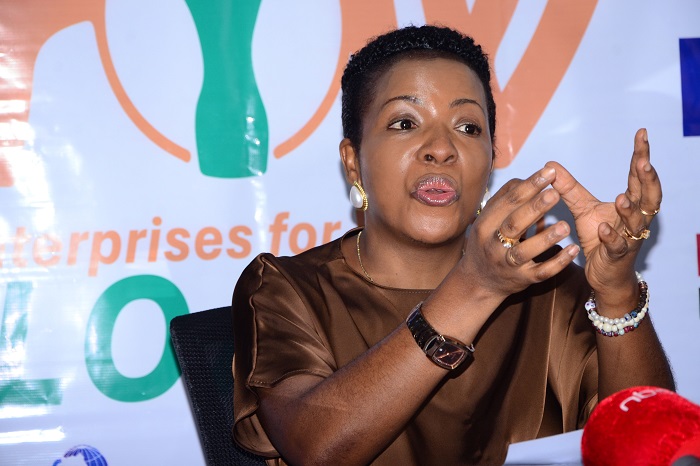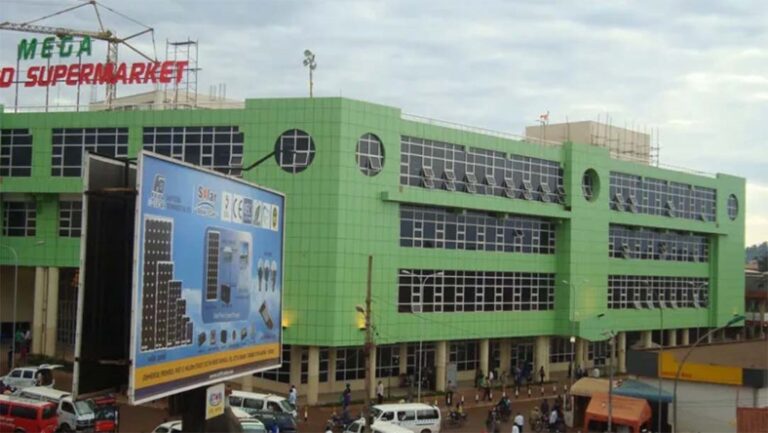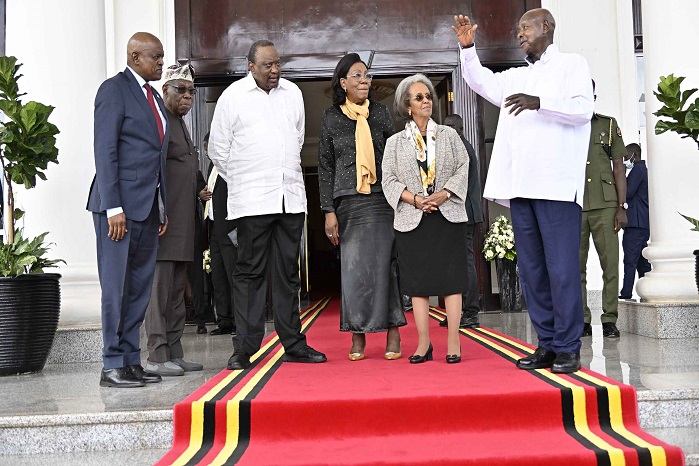
Dr. Ruth Aisha Biyinzika Kasolo, the Project Coordinator GROW-PSFU speaking during the press briefing held at PSFU offices, Kyadondo Road in Kampala on Wednesday 21 August 2024
Dr. Ruth Aisha Biyinzika Kasolo, the Project Coordinator GROW-PSFU speaking during the press briefing held at PSFU offices, Kyadondo Road in Kampala on Wednesday 21 August 2024
HABARI DAILY I Kampala, Uganda I Funds amounting to sh29b have already been deposited into the accounts of five banks participating in the GROW project.
The five-year World Bank-funded Generating Growth Opportunities and Productivity for Women Enterprises Uganda (GROW) project, is being run by the Private Sector Foundation Uganda (PSFU) and ministry of Gender, Labour and Social Development.
It is designed to increase access to entrepreneurial services that enable female entrepreneurs to grow their enterprises in targeted locations including refugee host districts.
The World Bank invested $217m (sh800b) in the vehicle aimed at supporting women entrepreneurs transitioning from micro to small and from small to medium enterprises.

Dr Ruth Aisha Biyinzika Kasolo, the GROW project coordinator, said that the funding will address key constraints of access to capital and enable women entrepreneurs across the country to access affordable finance to expand their businesses.
“We believe we have prepared women enough through business development training. This has been conducted in many parts of the country, targeting the likely beneficiaries,” she said, adding that women can now apply for funding for their businesses, at between 10% and 10.5% interest rates per annum.
She made the announcement early in the week at their offices along Kyadondo Road in Kampala.
She said the 5 banks include Centenary Bank, which obtained sh6.84b, DFCU Bank, which got sh6.48b and Post Bank which got sh6.84 has been passed on to.
Equity Bank obtained Sh2.05b, while Finance Trust Bank got sh6.84b.
“The sh29b released so far is only 40% of the contracted institutions’ year 1 allocation,” she disclosed.
The loans, which range from sh4m to sh200m, will include level 1 loans of sh4m-sh20m, where 17,000 beneficiaries are targeted. Level 2 loans of between sh20m-sh40m, has 10,500 targeted beneficiaries, while level 3 loans of between sh40m to sh200m have 1,250 women beneficiaries.
Biyinzika further revealed that women who repay the installments consistently for half of the period they have borrowed will receive a GROW bonus as a reward for their good performance.
“The rebate will range from 5% (for all women), 8% (for women entrepreneurs and those in refugee hosting districts), 10% (for women entrepreneurs that are considered as special cases. These include PWDs, women in the Karamoja sub region, and those in the Busoga-Bukedi sub regions.
She further revealed that micro finance institutions (MFIs) and SACCOs will also be used to lend money to women. Their selection is in advanced stages. At least 8 institutions drawn from all the regions of the country will be chosen to add to the 5 banks that are already on board
Biyinzika further disclosed that the loans are collateral free, and that they have instituted a de-risking mechanism, whereby only banks with women products including those that have limited or no collateral requirements.
She said that due to the hindrances they face in accessing development finance, we only want to deal with financial institutions which can offer their products to women entrepreneurs with a requirement for no security.
The project has capped the interest rate at between 10% and 10.5% per annum, for all the participating banks.
According to the World Bank, most women-led firms never grow past the micro level, while male-owned firms are twice as likely to move from micro to small size.
“Women’s businesses also tend to be located in more vulnerable sectors, and earn 30 percent less in profits than firms owned by men,” reads part of the World Bank GROW Project appraisal report.

It says lockdowns in 2020 and 2021 hit MSMEs hard, especially those owned by women, adding that chief among the factors that limit female entrepreneurship are household roles and responsibilities.
Social norms and risks of violence against women also influence the choices of Ugandan women for businesses sectors and sizes.
The World Bank adds that women entrepreneurs are likely to be excluded from the channels of information, networks, and mentors associated with the more profitable, male-dominated sectors and businesses within them.
“Additional factors that block women from developing growth-oriented enterprises in profitable sectors are related to the failure of existing business development services to address the needs of women-owned firms.”
Ugandan SMEs, especially those owned by women have for years been facing high interest rates on loan facilities. This prompted the Government to intervene and launch such initiatives as the Agriculture Credit Facility.
Its interest rate to the final borrower is up to a maximum of 10% per annum. This was revised up to 12% in 2010.
The benchmark interest rate in Uganda was last recorded at 10 percent. Interest Rate in Uganda averaged 11.19 percent from 2011 until 2024, reaching an all-time high of 23.00 percent in November of 2011 and a record low of 6.50 percent in June of 2021.
Reports have disclosed that Uganda has the highest proportion of women’s business ownership in the Africa region. The 2020 Mastercard
The Global Index of Women Entrepreneurs estimated that women own nearly 40 percent of all businesses.10 Earlier surveys have presented more varied estimates, suggesting female-owned enterprises make up between 23–44 percent of all businesses.
MSMEs are critical to economic growth. They employ nearly 2.5 million people, 90% of all private sector employees, produce 80 percent of manufactured products, and generate 20% of GDP.




